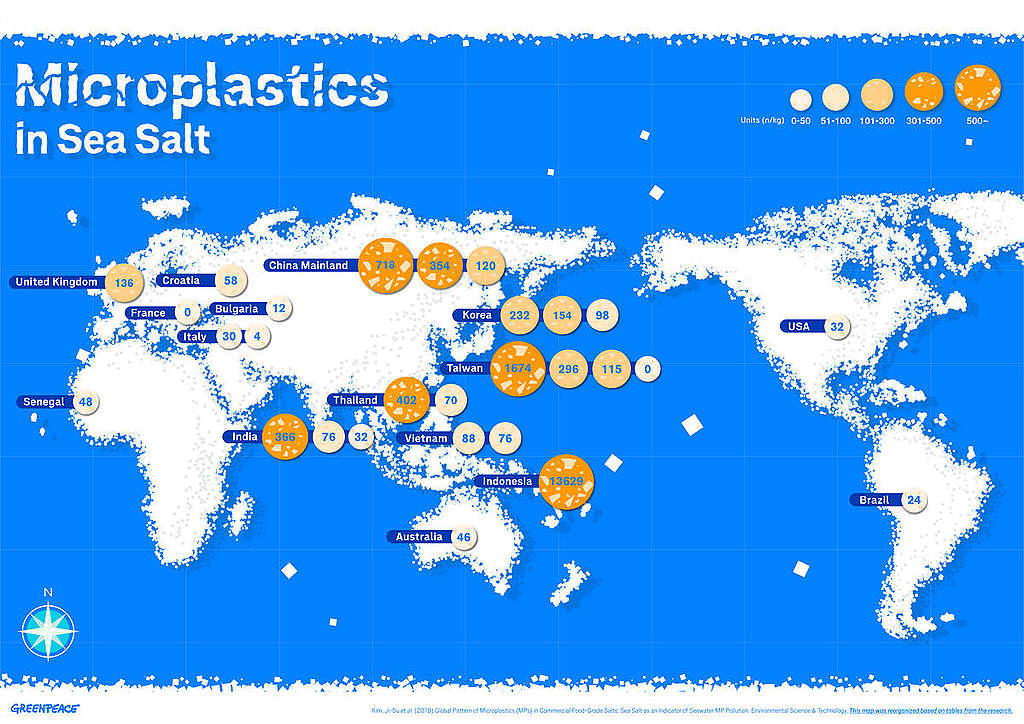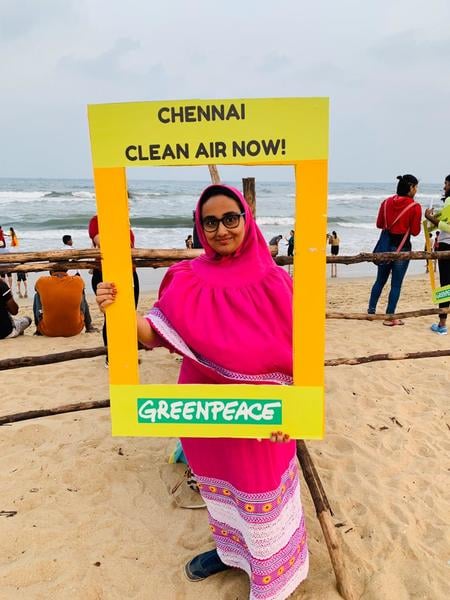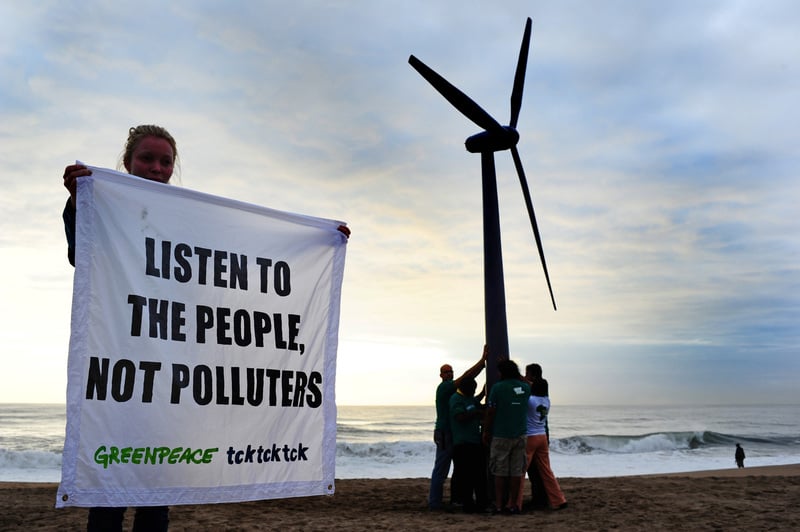Our much guarded food chain has long been breached by plastics, and hence, it did not come up as a surprise when a recent study co-designed by Kim, Seung-Kyu, Professor at Incheon National University and Greenpeace East Asia, suggested that over 90% of sampled salt brands globally contain microplastics. Microplastic contamination had earlier registered its presence in our water bodies – especially seas, soil, drinking water, marine life, beer and now it has invaded salt. Given the massive amount of pollution our undeterred dependency on plastics has eventually resulted in, it may soon end up in every form of life.
In scientific terminology, any fragment or a bit of plastic that is less than 5 millimeters in size can be considered as microplastics. Microfibers, microbeads and plastic strands generated as an outcome of degradation of larger plastic pieces – can serve as a few examples of the same.

Geographical Distribution of Sea Salt-contained Microplastics by Country or Region
The study further implies that an average adult consumes approximately 2,000 microplastics per year through salt (considering an intake of 10 grams per day of salt). This has even been substantially confirmed by another independent study conducted recently by gastroenterologists at the Medical University of Vienna, which found evidence of microplastics in the human gut. While the impacts of plastic contamination on human body are yet to be established, it is no less a cause of grave concern. If images of animals and birds choked to death with plastic waste are not appalling enough to cause shudder, human beings unknowingly ingesting microplastics that have made way into our salts, better be a wake-up call towards addressing this humongous threat to our very existence. The history of our planet has been defined by elements that characterized an era, like the Stone Age, Iron Age, etc. and we may now well be living in the self-imposed Plastic Age, which I’m afraid may end up laminating our entire planet and suffocating all its inhabitants.
Such is the nature of the emergency that the United Nations, earlier this year, called for an all-out war against Single Use Plastics, when it declared ‘Beat Plastic Pollution’ as the theme for the World Environment Day 2018. It further urged governments, industry, communities, and individuals to come together and explore sustainable alternatives and urgently reduce the production and excessive use of single-use plastic polluting our oceans, damaging marine life and threatening human health. In India alone, almost 25 states/UTs now have some form of ban on polythene carry bags. But in spite of this, the implementation and enforcement still remains lax and massive amounts of plastic waste from other sources still continues to end up in our water bodies and landfills.
The approach of doing away with single use plastics, if executed successfully, has immense potential of dealing with the ongoing situation. This can be well assessed by the fact that nearly 50 percent of the plastic we use is single-use or disposable. For the consumption leading into the massive production of single use plastics to be regulated, the larger onus lies not on consumers but on packaging companies and corporations using plastics in their respective brand propositions – products and/or packaging. After all getting rid of the plastics in our food chain should be addressed at its source. It serves well for the rationale around the aforementioned salt assessment report and other similar reports, not mentioning the salt brands tested since the cause for the presence of microplastics in salt didn’t lie so much on the salt producers as on the corporations who had vehemently and injudiciously been using plastics in their products which ended up as polluting our surroundings. This in turn puts direct accountabilities for solving the problem on the polluters at source.
One big step towards setting up polluter accountabilities in this regard has been another recent report by Greenpeace, which assesses responses based on a comprehensive survey sent over to eleven of the biggest fast moving consumer goods (FMCG) companies: Coca-Cola Company, Colgate-Palmolive, Danone, Johnson and Johnson, Kraft Heinz, Mars, Nestlé, Mondelez, PepsiCo, Procter & Gamble and Unilever. It evaluates the respective FMCG Company’s responses on how their commitments, actions and performances are addressing the environmental and social impacts of their plastic packaging and waste. The report makes it clear that FMCG corporations are a predominant force behind the throwaway economic model driving plastic pollution crisis; and concludes that unfortunately none of the companies surveyed have plans to put the brakes on the growing production and marketing of single-use plastics, while the solutions they are exploring will only perpetuate the problem.
Drawing parallels from the ‘plastic smile’ – with plastics now in our bowels, our gut feelings towards overcoming its menace can’t be covered with ulterior motives of making profits at the cost of our lives and our planet. What the world needs is real intent and intuitions in this regard – and not ‘plastic gut feelings’ to deal with the plastic gut fillings! For change to happen, the FMCG sector urgently needs to change its business model and prepare for a world where disposable products and packaging are no longer acceptable.
Furthermore as consumers, it is our individual and social responsibility to give up plastics in our lives and lifestyles, thereby shifting to more safe and eco-friendly alternatives. The idea is to create a demand driven economy towards alternatives and solutions as a counter to the existing one. The demand can pave the way for the economy to follow. Giving up single-use plastics like plastic straws, plastic cutlery, plastic bags, mineral water / drinks packaged in plastic bottles and even calling out defaulting companies (online and offline) can be a good start for a collective transformation which we as individuals and as a society are required to drive. If you can’t reuse it, refuse it – Intelligent choices, guided by the idea of a sustainable planet, clubbed with stringent regulations and enforcements is the only product packaging that our future can be best served in, to our next generations – It’s a gift, we better not wrap!
Rahul Prasad is a Communications Campaigner at Greenpeace India.


